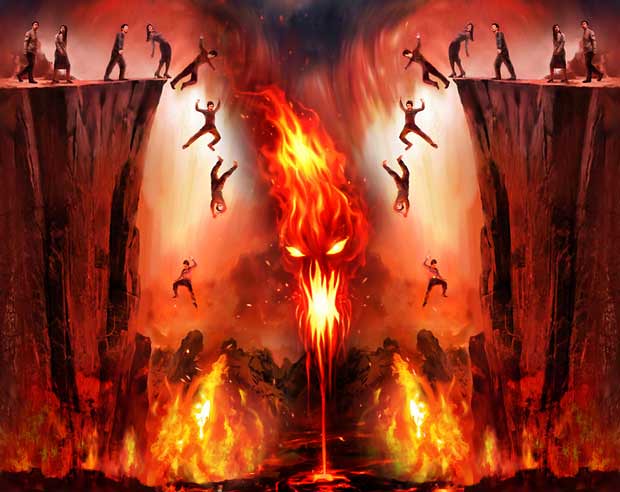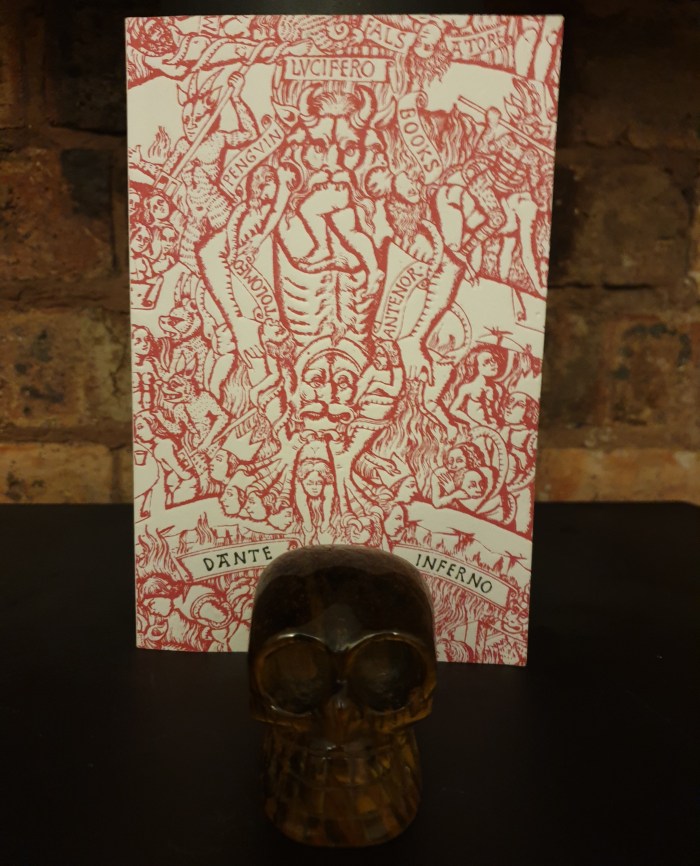I’m not really sure what I expected from this. Dante’s The Divine Comedy is one of those books that we’ve all heard of, many of the themes and scenes making their way into the arts and popular culture to this day. Recently it has seemed like a sign from the Universe forcing me to finally read it, noticing countless references to it in other books, and in TV shows and films I’ve watched.
Hell, I even make a tiny reference to it in my book, An Army of Skin (available from all good retailers. Well, Amazon).
Instead of going straight in for the trilogy, which includes Purgatory and Heaven of course, I thought best to start off with the most interesting setting; the darkest and most hideous of all places (apparently); HELL!!
Now I’ve never been one for poetry, even at school I felt the prose awkward and never really took to any poems I was forced to study. I think it’s something about the way the words are supposed to flow, I’m almost too engaged with reading it ‘correctly’ that a lot of the meat and potatoes of the words don’t really register like they should. If that makes sense?
We all know this epic poem was written in Italian, and how it is a rather difficult text to translate whilst remaining true to its original form. Words don’t rhyme the same way in other languages, so perhaps this was a stumbling block straight away. Of course, I realised this is something that couldn’t be helped.
Almost immediately I felt my aforementioned skepticism rearing its ugly head from the fiery pits. But it would be OK, surely? This is the tale of a dude descending into Hell, right? That’s got to be brutal and messed up. Reading about countless souls endlessly tortured in varying amounts of diabolical and sadistic methods; that’s my bag, baby.
Dante is the protagonist of the story, guided by Virgil, a Roman poet. And this is the end of my knowledge of the tour guide. And I think I would have got a lot more out of this if I’d known a little more about him.
And speaking of knowing more, it seems I needed to know a lot more about things like history to understand just what in the Hell he was going on about in certain places. Alas, my knowledge of 14th Century Florentine politics is not all that great, I’ll admit. Dante certainly has his views (I think) and makes sure that people from his time, and those from history, are suffering down there in the bowels of the Earth.
But to the casual reader (me) these characters were just names. OK, some I’d heard of, but not many.
I’ve read negative reviews where people slate the poem for Dante’s arrogance at portraying his own personal agenda with regards to the victims in severe torment down there. The copy I read had notes to accompany each Canto, explaining the characters described, which helped a little. But there were so many of them with so many summaries of what they did and how they died, etc. I kind of lost track/attention.
My main area of complaint – and I’ll seem very ignorant here – is that the whole thing didn’t seem nasty enough. I was expecting page upon page detailing gruesome scenes with ‘eww’ moments everywhere. And yeah, there are some, but on the whole it’s alott tamer than I was expecting. I know it was written a long, long time ago, and modernity has showed us many more graphic depictions of human suffering both in fiction and real life, but come on.
I wasn’t very far into this before I started to feel my attention waining, and I surely missed many details because of this. But I was steadfast, and soldiered on like a trooper, if only to see how it would all end when our Dante meets the big man downstairs. But Satan’s cameo was a little meh. He was munching on a guy who betrayed Jesus, Lando I think his name was. He appeared for maybe half a page or so, and that was it.
Now I’m not trying to dissect this poem, I’m far too unintelligent to do such a thing. But I do have a couple of questions. I think I’m right in saying that Dante was a believer, and that this tale of fiction was based on his real beliefs about what Hell would be/is like. And that’s cool. So why do we encounter creatures from Greek myths? Isn’t a myth something that’s made up? So if Hell is supposed to be real then why the Hell (I’m using this word quite a lot) is there a Minotaur down there, or Cerebrus, or references to the Trojan horse and other ancient battles that supposedly never happened?
OK, OK, the notes say that Dante was influenced by other epic poems so perhaps he took some poetic license to add these, but reading this it all seemed like his mind was constantly thinking ‘woah, what other weird-ass creatures can I put in this?’
Many of the tortured souls, ie. those inflicted for an eternity of suffering, still manage to have a little chat with Dante, telling him all about their lives and subsequent punishments. Yes, I know it’s just a story, but I’d much rather have witnessed them screaming into oblivion with no time to talk with this nosy mortal.
One other thing that bugged me, and I suppose bugs me in general about the idea of Hell, is this. If Satan is the boss downstairs, why do those who sinned the most get tortured the most? If I was running the joint, and hated God like, loads and that, I would be punishing the ones who maybe only sinned a little bit, and exalting those that truly spent their lives dissing the Lord and worshipping me.
Surely the Devil has got a little bit of an ego?
Who exactly is in charge down there? At one stage a torture-e proudly blasphemes and is promptly beaten. That doesn’t make sense to me, shouldn’t he have been let off a bit for that? But then, what do I know?
If you love this poem then you are, by now, belittling me for not having the capacity to ‘get it’. And you’re right, I really don’t. It was a slog; countless characters I knew nothing about but the author assumed I did, torture practices that didn’t seem anywhere near graphic enough, and an ending that could have been so much more. I appreciate it’s an allegory and all that, and it’s old, and it’s all very literary, but it never really clicked with me.
One positive thing, though; the cover is awesome. But we all know that’s not how we judge a book!
I will be giving the next two sequels a miss, I believe things get happier so I’m fine with them passing me by.
Thanks for reading, especially if you have been shaking your head throughout.
See you in Hell!!

Categories: book review


If Dante was making political statements, then maybe he didn’t think he had to delve into the gore to get his point across. I had to read it in high school. Most of it (like 90 percent!) went over my head!
LikeLiked by 1 person
Ha, it wasn’t just me then! Although I’m not in high school anymore!
LikeLiked by 1 person
I like the idea of the 9 circles and such but aren’t fussed about reading the whole thing for a lot of the reasons you’ve said. Though one thing – Satan is not the boss of Hell. That’s a more modern idea, while in classical thought, Hell was originally created to punish him and his fallen angels. I think in Dante’s Inferno the pit is actually the crater from Satan’s fall, with his own wing beats ironically keeping Cocytus frozen, which is neat.
LikeLiked by 1 person
Yeah that makes more sense and actually did seem plausible. Its a shame, satan ruling seems a much better concept instead of freezing his balls off in huge block of ice!! Thanks for reading!!🤘
LikeLike
Yeah, you’re a better man than me (I’m not one, firstly, lol) I have no interest in reading anything too ‘deep’ and political (Lord of the rings was a slog for me) but thanks for putting yourself out there and doing it for the people!!
Good point about Hell btw – why do people who’ve been bad get punished, surely that’s the whole premise of the devil man? They should get praised for their naughtiness.
Good review, but I’ll pass on reading this methinks.
LikeLiked by 1 person
Ha thanks! Just read the synopsis on Wikipedia and save yourself the ‘depth’.
LikeLiked by 1 person
Good idea!
LikeLiked by 1 person